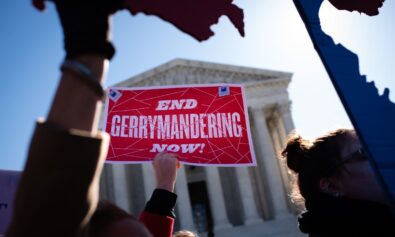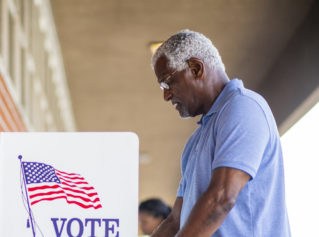Fourteen years ago this week, a white sitting judge in Louisiana’s Terrebonne Parish attended a Halloween party at a public restaurant dressed as a prisoner in an orange jumpsuit and handcuffs, wearing an Afro wig and blackface makeup. His wife accompanied him, clad as a cop. After local NAACP leaders filed a complaint, district judge Timothy Ellender was suspended by the Louisiana Supreme Court in 2004 after a state investigation determined the judge’s actions “perpetuated the notion of African-Americans as both inferior and as criminals” while questioning Ellender’s “ability to be fair and impartial toward African-Americans who appear before his court as defendants in criminal proceedings.”
After his suspension, Terrebonne voters reelected Ellender, far from surprising in an at-large election system where white voters made up close to 80 percent of the electorate and commonly vote as a bloc in open primaries for five judicial seats in the southeastern Louisiana parish. Given such racialized dynamics have made it virtually impossible for Black voters to elect a judicial candidate of their choice, in February 2014, the Terrebonne Parish Branch NAACP filed a lawsuit in federal district court to “eliminate a voting practice that was enacted and/or has been maintained with a discriminatory purpose, and that dilutes the voting strength of Black voters in Terrebonne Parish.” In August 2017 they won a historic decision, leaving it up to the state legislature to ultimately determine a viable redistricting plan that more equitably represents African-Americans when it convenes next year.
At least, that’s what is expected. However, the defendants in the lawsuit — Louisiana Governor John Bel Edwards and Attorney General Jeff Landry — recently initiated appeals to prevent the remedial process, each retaining lawyers to do so. Landry has created controversy with his hiring of attorney Jason Torchinsky from the Virginia-based Holtzman Vogel Josefiak Torchinsky, a firm currently being sued by a voting rights group in North Carolina for making false and defamatory claims of voter fraud, and the subject of a recent related complaint of unprofessional conduct with the North Carolina State Bar.
“Both the governor and the attorney general have filed a notice of appeal in the Fifth Circuit, the appellate court over Louisiana, and we have moved to dismiss their notice because we think it’s premature for them to be appealing the district court’s ruling,” said Leah Aden, senior counsel for the Legal Defense Fund, which represented the local NAACP chapter in their challenge to the at-large system in federal court. Aden explained that congressional statutes stipulate certain events are supposed to happen prior to such an appellate process and those events have yet to take place, but the defendants are nonetheless appealing in an attempt to salvage the current voting arrangement.
“They are basically arguing that the court’s ruling has the practical effect of stopping at-large voting from happening,” said Aden, contending that “is not a strong argument.” In the interest of judicial resources and a more thorough legal process, continued Aden, “The parties should be allowed to move toward the remedial proceeding and the court should enter a judgment and order a remedy. That is the appropriate time to bring an appeal.”
The defendants see it differently. Their recent response to the motion to dismiss states, “The district court’s ruling and scheduling order effectively enjoin Defendants from using the existing at-large voting system” and that “the ‘practical effect’ of the district court’s ruling and scheduling order is an injunction, which is appealable.”
Aden finds the defendants’ measure particularly troubling given what African-Americans in Terrebonne have been through, be it their historic lack of electoral choice or the offensive racial antics of a now-retired longtime judge like Ellender.
“Our clients have long been waiting for a remedy to the voting rights violations they have endured,” said Aden, pointing out “for the past several years, the governor and the attorney general have really proceeded lockstep together defending discrimination.” She questioned the retention of a “private law firm based out of Virginia that is ideologically conservative and undergoing a lot of controversy because of its work in North Carolina where Black voters were challenged for their eligibility to vote when there was no evidence they were ineligible.”
Unfortunately, Black voters have been challenged by discrimination in Louisiana’s Terrebonne Parish for a long time. For two centuries, its voting system has all but guaranteed a lack of African-American electoral impact. After the passage of the Voting Rights Act in 1965, such at-large systems were instituted across the state to ensure the push for Black equity did not impact lily-white electoral patterns. Over time, federal scrutiny by the Department of Justice and local efforts provoked reforms that mostly dumped at-large voting and created majority-Black electoral sub-districts across Louisiana.
However, the 32nd District of Terrebonne Parish has remained a holdout. And with this lack of district-based voting, the potential electoral influence of the Black residents that make up a geographically-concentrated 20 percent of the Parish population is consistently diluted, leaving them no real chance of electing candidates of their choice. Although Juan Pickett became the first Black judge in the Parish in 2014, he ran unopposed, taking over for the controversial Ellender, who’d reached mandatory retirement age.
“As long as you reside in the Parish and you’ve been an attorney for eight years, you can run,” explained Louisiana attorney Ronald L. Wilson, who collaborated with the Legal Defense Fund on the case. Theoretically, noted Wilson, “You could have five people who live next door to each other occupying all five seats.”
This is not hard to imagine in a parish where judges dress publicly in blackface for laughs, and that once made national headlines for trying to criminalize sagging pants. Still, despite the recent move by the state governor and attorney general to appeal the historic decision — and the controversial legal representation of the attorney general — Aden is not deterred as she looks ahead to the remedial process by the state legislature and, if necessary, beyond.
“We’re looking for a full remedy to intentional discrimination,” clarified Aden, noting that if the state legislature “doesn’t come up with a remedy, the court has the power to do so. And we’re going to continue to fight until our clients have exactly what they are entitled to, which is a fair chance to elect a judicial candidate of their choice to the state court that serves them.”


